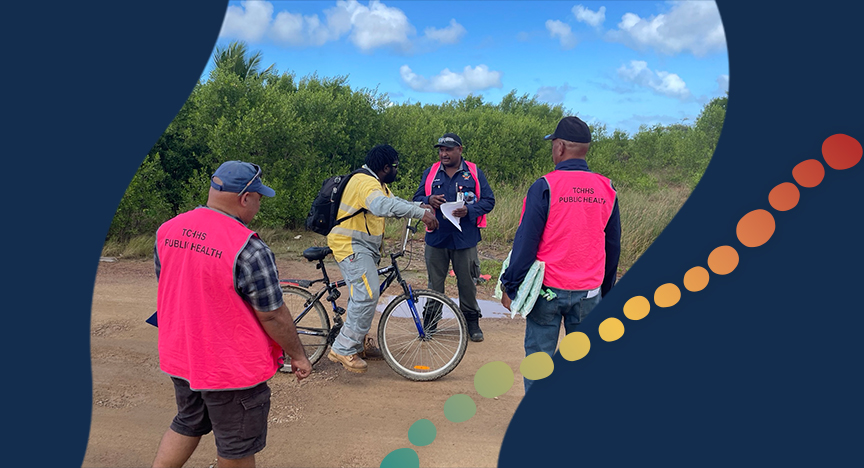
Environmental health workers speak with a local resident
Summary
- Three cases of malaria have been detected on Saibai Island, in the Torres Strait, following a case detected on Boigu Island in early July.
- Mosquito spraying and control measures have been undertaken on both Boigu and Saibai islands, as well as door-to-door screening for symptoms.
- Malaria is a mosquito-borne disease and is not transmitted from person to person. It is spread to people by the bite of particular types of mosquitoes.
Three cases of malaria have been detected on Saibai Island, in the Torres Strait, following a case detected on Boigu Island in early July. These are the first cases of malaria detected in the Torres Strait since 2013, when two cases were detected on Saibai Island.
There has been a joint effort between the Torres and Cape HHS Public Health Unit, the Tropical Public Health Service in Cairns, our staff at the Boigu and Saibai primary health care centres, and our local councils to respond to these cases.
Mosquito spraying and control measures have been undertaken on both Boigu and Saibai islands, as well as door-to-door screening for symptoms.
The most common symptoms of malaria are high fever, headache, backache, nausea, vomiting, and muscle and joint pains.
Residents of Boigu, Saibai, and all Torres Strait islands should be on alert for symptoms of malaria and take measures to prevent being bitten by mosquitoes.
Malaria is a mosquito-borne disease and is not transmitted from person to person. It is spread to people by the bite of particular types of mosquitoes.
As a result of the recent cases, individuals on Boigu and Saibai islands, or travelling to the islands, also are recommended to take appropriate medication to prevent malaria and should discuss their individual circumstances with their local health care provider.
Residents can do their part to protect themselves by:
- Wear light-coloured clothing, (long-sleeved shirts and long pants wherever possible to cover exposed skin).
- Use personal insect repellent containing DEET.
- Use long-lasting ‘surface’ or ‘cockroach’ insecticide spray in places where mosquitoes can hide.
- Install insect screens that are in good working order in your home and office.
- Tip it, store it, throw it — tip out water from containers weekly, or dry store containers under cover and discard rubbish properly.